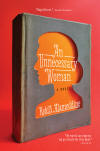An Unnecessary Woman
The beautifully written novel An Unnecessary Woman, by Beiruti writer Rabih Alameddine, may be best appreciated by a mature reader, although any lover of serious books should enjoy this one.
The beautifully written novel An Unnecessary Woman, by Beiruti writer Rabih Alameddine, may be best appreciated by a mature reader, although any lover of serious books should enjoy this one.
Not a plot-driven novel, this is a roaming review of ideas defined by thought-provoking quotes from great writers, as explored by an old woman who is contemplating her life’s value. Seventy-two-year-old Aaliya Saleh, alone in her apartment, has lived through the Lebanese Civil War, mostly as background outside her window. Her apartment is full of books and translations she has done at one remove from the originals, translations of translations into Arabic. She was married unhappily and briefly once, until her husband pronounced, “I divorce you.” The only family she feels close to is her mother, who screams when she is brought by Aaliya’s half-brother to live with her. Aaliya’s only other male contact was a young man until he changed and disappeared into the army. Her one friend, Hannah, is dead. She keeps aloof from people, even her fellow apartment residents. With her mother’s screams troubling her and Hannah’s death too difficult to face until the end, we follow her thoughts as she zigzags across time and her beloved Beirut.
What is refreshing from the start is that this is a woman with no self-delusions—“wrong as usual,” she says of herself. “I am alone. It’s a choice I’ve made, yet it is also a choice made with few other options available. Beiruti society wasn’t fond of divorced, childless women in those days.” She calls herself “Aaliya, the separated.” She tackles life’s hard questions and realities, the fact that people divorce themselves from other people’s bad events. Madame Bovary’s betrayals are not ours; hunger and violence in other countries “isn’t about you.”
Then we learn about the reality in her life. Her translations, which she starts religiously at the year’s beginning, are less faithful to the original, being translations of French and English translations of the originals. Beyond that, she’s never published! Committed to the process, not the final product, she “creates” and “crates.” Her favorite writer, Pessoa, justifies her actions in “The Book of Disquiet”:
The only attitude worthy of a superior man is to persist in an activity he recognizes is useless, to observe a discipline he knows is sterile, and to apply certain norms of philosophical and metaphysical thought that he considers utterly inconsequential.
She compares the process of translating to “a Wagner opera” where the “tension builds” and notes: “During these moments, I am no longer my usual self, yet I am wholeheartedly myself, body and spirit. During these moments, I am healed of all wounds.”
However, this woman, like everyone, has pretensions. The main difference is she admits them. She doesn’t want to be “normal, stupid,” but aims to be Miss Jean Brodie’s “crème de la crème.” From admitting “All I am is lonely,” she moves to Kafka and Pessoa and dreams of “being a speck, having a nonspeaking role in a grand epic.” Yet at the same time, she is “shattered by failures and shabby furniture.” She asks, “What is a necessary human?”
Whatever her life is, it is literature, or as she calls it, her “sandbox.” Her insights, such as that, are worth it. “Novels are scenes, or, more precisely, images,” and “life is “a collection of scenes.” She dislikes memoirs and epiphanies, and old people talking only of themselves, yet what is she doing? “Most of the books published these days consist of whines followed by an epiphany. I call these memoirs and confessional novels happy tragedies.”
This novel’s descriptions are beautiful as well, such as those of Aaliya’s home, Beirut, whose main streets “cut the city with a butcher’s cleaver” while an “ancient one wiggles its hips quite a bit,” whose “winter air is like bronze” and whose nighttime “sky puts on a darkening blue coat.” This is “the Elizabeth Taylor of cities,” inefficient and offering a random life, especially for an elderly woman who cannot expect to find her apartment intact when she returns to it.
Admitting to getting off the track in her story, she finally faces her friend Hannah’s death. And at the end, crisis comes to her own life. However, ”destruction is an opportunity to break free from rules I’ve set for translation.” And so just when her safe harbor of isolation disappears, she admit to an epiphany.
This very literate novel will probably appeal mostly to a well-read and older reader. But I have no trouble defining the value of Aaliya’s life: she has re-stimulated our love of literature, and makes me want to read some of her favorite writers.





